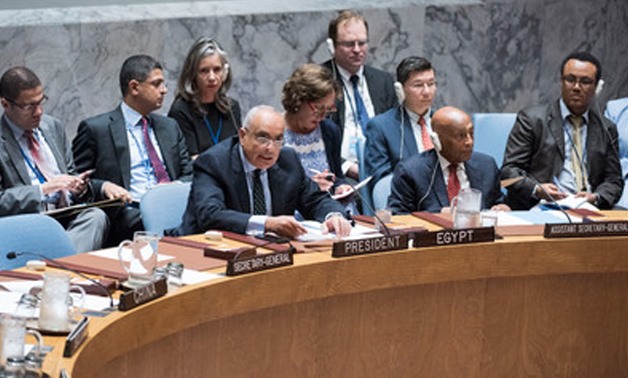
Amr Abdel Latif Aboulatta (front left), Permanent Representative of Egypt to the UN and President of the UNSC for August - Photo credit UN website - Kim Haughton
CAIRO – 4 August 2017: Headed by Egypt in August, the United Nations Security Council (UNSC), discussed in a briefing Thursday ways to enhance the effectiveness of the United Nations (UN) sanctions as a means and not an end result.
The Assistant Secretary-General for Political Affairs, briefed the UNSC on the role of UN Secretariat in supporting the UNSC and its affiliated sanctions’ committees to ensure the effectiveness of sanctions imposed on various countries. He also added that the UN Secretariat continuously works to minimize the negative impact of sanctions on humanitarian, economic and social aspects. .
This briefing comes as part of the UNSC program of work for August which focuses on threats to international peace and security, including efforts to prevent terrorists from acquiring weapons, according to a press conference by UNSC president for August, Amr Abdellatif Aboulatta (Egypt), on Wednesday at the UN headquarters.
Aboulatta, spotlighted that the briefing represents an opportunity to hear from countries currently under sanctions, as well as those emerging from sanctions. “At the end of the day, sanctions are not an end but a means,” he said, according to the UN official website.
From his side, the Egyptian Ministry of Foreign Affairs spokesperson, Ahmed Abu Zeid, said that Egypt realizes the importance of strong international coordination to ensure and enhance the effectiveness of the UN sanctions system, while mitigating their unintended negative effects on nations where sanctions are imposed. He explained that this responsibility remains in the hands of the UNSC, by examining the most appropriate approaches to implementing the sanctions while monitoring and evaluating their effectiveness and applying lessons learned. Furthermore, Abu Zeid, said that any sanctions should be fair in order to protect the credibility of the international community.
Abu Zeid said that Egypt called on the UNSC to translate the declared positions by its member states on the need to enhance the sanctions system into actions. He added, that this would send a message to the international community that the UNSC recognizes the vital role of this system as a tool to ensure international peace and security, as well as the need to develop it.
Egypt is chairing the UNSC for the second time since its non-permanent membership in the council 2016. As a result of its endless efforts and commitment to encounter international terrorism, Egypt managed to advocate in the UNSC adopting Resolution 2370 on banning terrorist groups, organizations, and individuals from receiving weapons and forcing sanctions on any involved parties in the process.
Earlier in July, the Egyptian delegation in New York organized an informal meeting of the Security Council to hear the experiences of three African countries on the role of UN sanctions in restoring stability in the countries. Furthermore, in the same month Cairo hosted a discussion on the UN sanctions system, with the participation of representatives of the UN and members of the Egyptian National Coordination Committee for the Implementation of UN Sanctions. The discussion was organized in cooperation between the Ministry of Foreign Affairs and the Cairo International Center for Conflict Resolution and Peacekeeping.
 A wide view of the Security Council meeting on enhancing the effectiveness if UN Sanctions - Photo credit UN Website
A wide view of the Security Council meeting on enhancing the effectiveness if UN Sanctions - Photo credit UN Website


Comments
Leave a Comment